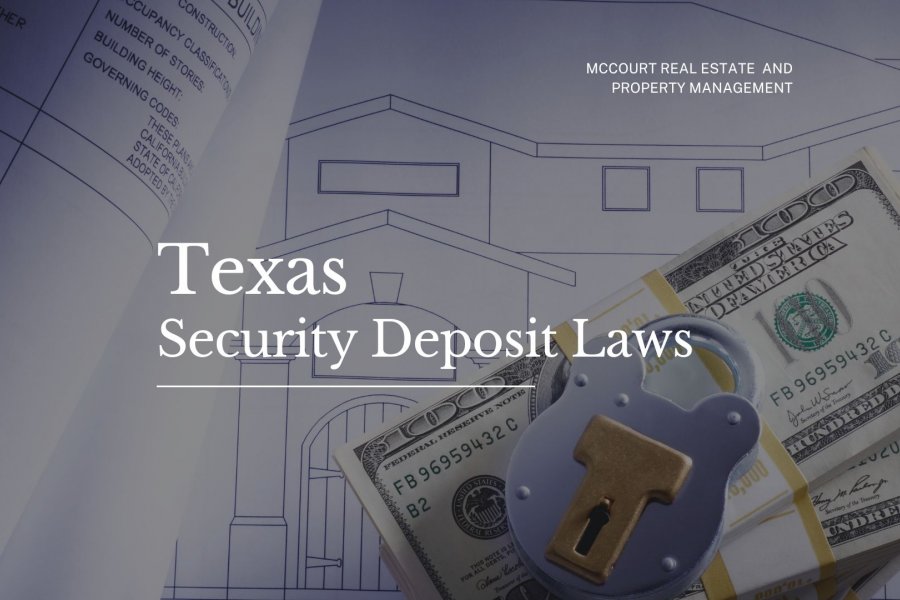
Most landlords in Texas require their tenants to pay a security deposit. The security deposit is intended to ensure the fulfillment of the lease. It helps provide a layer of financial protection in case a tenant fails to abide by the terms of the lease agreement. A good example of this is when a tenant causes damage exceeding normal wear and tear.
But there are a set of security deposit laws that you, as a Texas landlord, must abide by. These security deposit regulations are primarily regulated under Texas property code § 92.102 and the Texas landlord-tenant laws.
But it’s important for all Texas landlords like you, to understand their rights and responsibilities regarding a security deposit. Which is why we at McCourt Real Estate have put together this guide on Texas security deposit law.
Texas Security Deposit Limits
Under Texas security deposit laws, there are no limits as to how much you can charge your tenants as a security deposit. But you may want to keep the security deposit amount reasonable in order to keep your rental property competitive in the market. Charging the equivalent of one month's rent usually suffices for a security deposit, even for covering damage beyond normal wear and tear.
Pet Deposits
As a Texas landlord, you have the right to ask for an additional security deposit from prospective tenants who have pets. This usually ranges anywhere between 40% and 85% of the rent amount. You can use the security deposit to cover any damages the pet causes under Texas property code.
But you must exempt tenants with service animals as disability is one of the protected classes under the Texas Fair Housing laws. What’s more, service animals are working animals, and therefore is not subject to the same standards as a normal pet.

Security Deposit Receipt
Some states require that landlords provide their tenants with a receipt when the security deposit is received. But this isn’t the case in Texas. Even as this is the case, we would advise that you send a letter or email when you've received the deposit for purposes of record-keeping.
Allowable Security Deposit Deductions
As a landlord, you cannot play around with the tenant's security deposit for any reason. The security deposit does not belong to you. It legitimately belongs to the tenant, it is held in trust on the tenant’s behalf until the end of the occupancy. In the meantime, it is held on your books as an “Outstanding Liability”. After the tenant moves out, you will reconcile the security deposit and send it back to the tenant, less any rightful deductions.
The following are the allowable reasons for security deposit deductions as per Texas law after giving a tenant written notice to vacate:
-
Unpaid rent. If the tenant breaks their lease and moves out before the end of their lease or rental agreement, the tenant must continue to pay until the official end of the lease or until another tenant moves in, whichever comes first under the Texas property code.
-
Unpaid utility bills. Some utilities for the rental property will naturally be in the name of the tenant. If they move out without clearing them, you can make appropriate deductions from their deductions. A tenant surrenders their responsibility to pay the utlities once they stop paying rent and cancel their agreements.
-
Illegal property alterations. If a tenant makes an illegal alteration to the unit, such as removing a hardware on a wall, you can hold them liable for the payment of reversing the changes.

-
Excessive cleaning costs. Tenants must return their rental premises in the same level of cleanliness that existed at the beginning of the tenancy. If they don’t, you can make appropriate deductions to their deposit.
-
Lease violations. Any costs you incur resulting from a tenant’s breach of the lease or eviction can be deducted from their deposit.
-
Damage exceeding normal wear and tear. Examples of such damage include a smashed bathroom mirror, missing tiles, a torn carpet, painting the ceiling black, or holes in the wall. If a tenant causes damages beyond normal wear and tear, you can use part of their deposit to cover the costs.
Security Deposit in Lieu of Last Month’s Rent
Texas law expressly prohibits tenants from using a security deposit as the last month’s rent. If the tenant owes rent at the end of their lease, they must cover the unpaid rent. If your tenant tries to pay for the remaining rent with the security deposit, you can hold them liable for paying up to 3X the rent they are withholding in small claims court, plus any attorney fees and any damage beyond normal wear and tear.
Change in Property Ownership
In case the property’s ownership changes, the outgoing landlord is obligated to send the deposit, or whatever remains of it, to the incoming landlord. The incoming landlord then assumes the responsibility for storing and returning the deposit under the Texas property code.
The incoming landlord must also notify the tenant that they have acquired the property and are responsible for their security deposit.
Returning a Tenant’s Security Deposit
As a Texas landlord, you aren’t obligated to return the security deposit if your tenant did not provide you a forwarding address. When provided with a tenant's forwarding address, you’ll have 30 days to return the security deposit, either completely or partially, after the tenant vacates the unit.
If you’re making deductions to the deposit, you must give the tenant an itemized list of deductions beyond normal wear and tear within the 30-day period.

Wrongfully withholding your tenant’s security deposit can have consequences. You may be liable for paying three times the wrongfully withheld amount plus any reasonable attorney fees. If the landlord fails to provide the tenant with an itemized list when making deductions may result in the landlord losing any right to keep any portion of the deposit.
Texas Security Deposit Laws: Bottom Line
Understanding Texas security deposit laws is essential to avoiding potential future disputes with your tenant. You’ll know how much to charge, how to store it, when to return it, and which deductions to make, among other things like advance notice of deductions.
If you have further questions, McCourt Real Estate & Property Management can help. We are experienced property managers that are dedicated to helping owners in the Midland rental market realize their goals for the rental unit.
As a full-service property management company, you can count on our help in all aspects of real estate management. From marketing your rental, to screening tenants, to collecting rent, to maintaining it. Get in touch today to get started on everything from security deposit law to Texas property code for your rental unit.
Disclaimer: This blog should not be used as a substitute for legal advice from a licensed attorney in your state. Texas law may change, and this post might not be updated at the time of your reading. Please contact us for any questions you have in regard to this content, or any other aspect of your property management needs